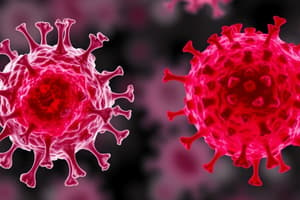Podcast
Questions and Answers
Which cells are the most efficient antigen presenting cells (APCs)?
Which cells are the most efficient antigen presenting cells (APCs)?
- B lymphocytes
- Macrophages
- Dendritic cells (correct)
- Langerhans cells
Where are dendritic cells primarily located?
Where are dendritic cells primarily located?
- In the liver
- In the bloodstream
- In the bone marrow
- Under the skin and mucosa (correct)
What is the role of dendritic cells in the immune response?
What is the role of dendritic cells in the immune response?
- Storing antigens for future use
- Processing and presenting antigens to activate T cells (correct)
- Producing antibodies
- Destroying pathogens directly
How do protein antigens bind to MHC molecules on APCs?
How do protein antigens bind to MHC molecules on APCs?
Where do dendritic cells transport captured foreign antigens for presentation to naive helper T cells?
Where do dendritic cells transport captured foreign antigens for presentation to naive helper T cells?
Which type of antigens require antigen processing and conversion to peptides for binding to MHC molecules on APCs?
Which type of antigens require antigen processing and conversion to peptides for binding to MHC molecules on APCs?
Which of the following is true about the MHC-II pathway?
Which of the following is true about the MHC-II pathway?
Which type of antigen-presenting cells can process extracellular antigens for MHC class I presentation via cross-presentation?
Which type of antigen-presenting cells can process extracellular antigens for MHC class I presentation via cross-presentation?
What is the source of protein antigens presented by MHC class II molecules?
What is the source of protein antigens presented by MHC class II molecules?
Which pathway is particularly important for activating CD8+ T cells to respond to virus-infected cells, tumor cells, and dying cells?
Which pathway is particularly important for activating CD8+ T cells to respond to virus-infected cells, tumor cells, and dying cells?
Which type of antigens are processed and presented by all nucleated cells?
Which type of antigens are processed and presented by all nucleated cells?
Which pathway involves the use of autophagy to gain access to lysosomal degradation for antigen loading?
Which pathway involves the use of autophagy to gain access to lysosomal degradation for antigen loading?
Which cells are considered professional antigen-presenting cells (APCs)?
Which cells are considered professional antigen-presenting cells (APCs)?
In the MHC-I pathway, what is the source of the endogenous antigens that are processed and presented?
In the MHC-I pathway, what is the source of the endogenous antigens that are processed and presented?
What is the role of TAP proteins in the MHC-I pathway?
What is the role of TAP proteins in the MHC-I pathway?
In the MHC-II pathway, how are exogenous antigens processed and presented?
In the MHC-II pathway, how are exogenous antigens processed and presented?
What is the role of CD8+ T cells in the immune response?
What is the role of CD8+ T cells in the immune response?
How are MHC-I molecules assembled and transported to the cell surface?
How are MHC-I molecules assembled and transported to the cell surface?
Flashcards are hidden until you start studying




